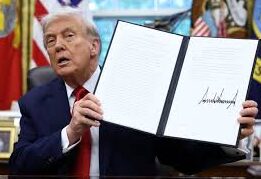Canadian travellers are skipping trips to the United States in large numbers, frustrated with President Donald Trump’s tariffs and political rhetoric. The backlash is hitting American destinations hard, especially those that rely on cross-border visitors.
So far this year, visits from Canada to the U.S. are down 25.2%, according to Tourism Economics. In July, car arrivals alone plunged 37% compared with the same month last year.
“Canadians were already uneasy about their finances, but the policies and rhetoric from Washington have made things worse,” said Amir Eylon, CEO of Longwoods International, which tracks Canadian travel sentiment.
A July survey from the firm found 80% of Canadians influenced by U.S. politics cited tariffs and economic policy as the main reason they’re staying away. Another 71% pointed to political statements by U.S. leaders, up from 64% just a few months earlier.
Instead of driving south for vacation, many Canadians are choosing to stay within Canada or fly elsewhere, with Mexico, the Caribbean, and Western Europe high on the list.
The trend isn’t limited to Canada. Visitors from Western Europe and Asia have also slowed, experts say. International arrivals to the U.S. fell three months in a row, including a 3.1% drop in July, leaving the year-to-date decline at 1.6%. Tourism Economics, which had predicted a 9% rise in overseas arrivals for 2025, now expects an 8.2% fall.
The situation could worsen when a new $250 “visa integrity fee” takes effect October 1. The fee, part of Trump’s tax and spending law, will be added on top of existing visa charges for most nonimmigrant travelers, including those from China, Mexico, and Brazil.
The U.S. Travel Association blasted the measure, calling it “a misguided junk fee” that could push upfront costs up by 130%. The timing is especially painful as cities gear up for major global events, from the 2026 World Cup and America’s 250th birthday to the 2028 Olympics.
A Homeland Security spokesperson defended the plan, saying it was part of Trump’s “One Big Beautiful Bill” to strengthen immigration policy.
Tourism boards across the country are already adjusting. Boston, for example, had expected international visitors to rise 15% in 2025 but now predicts a 10% decline. Its tourism office is launching campaigns in Mexico, the U.K., and Canada, including an event in Toronto next month.
In Rochester, New York, where up to 15% of tourists usually come from Canada, officials are bracing for a weaker season.
“We know some Canadians are choosing to stay home or go elsewhere,” said Rachel Laber Pulvino of Visit Rochester.
For now, U.S. tourist towns are waiting to see if fall campaigns and winter weather can lure their northern neighbors back across the border.






